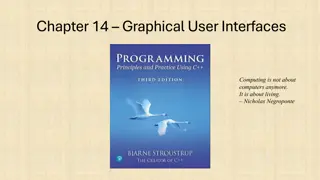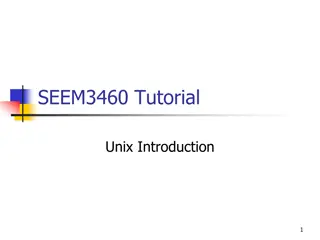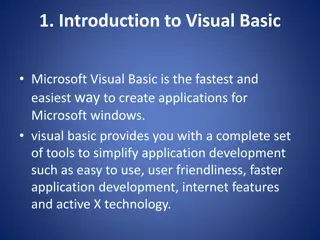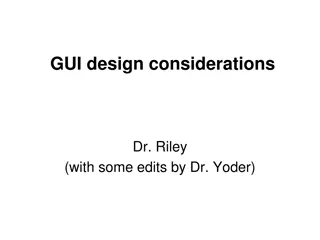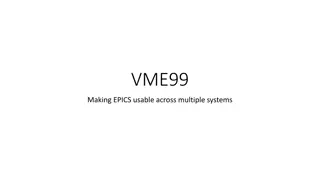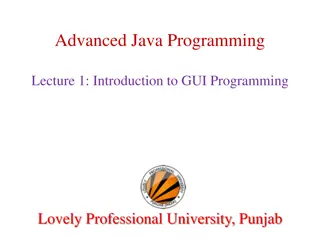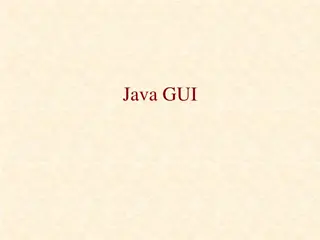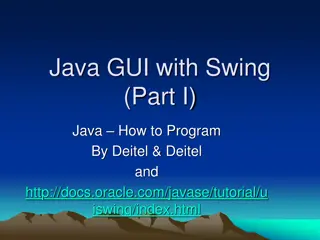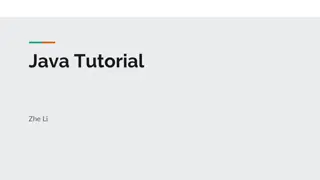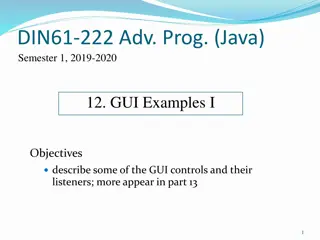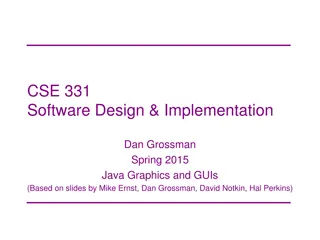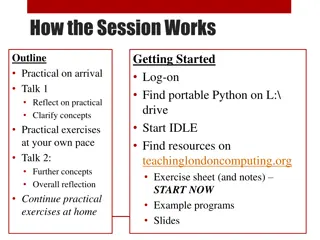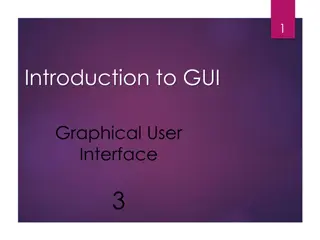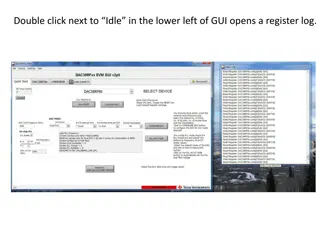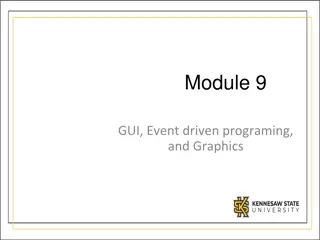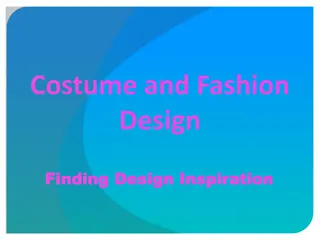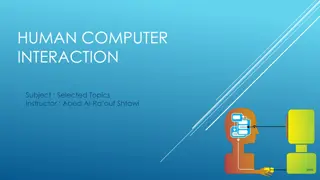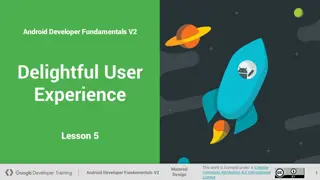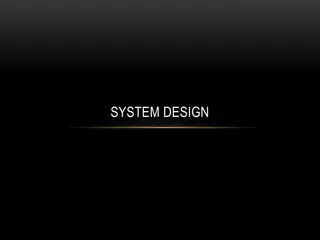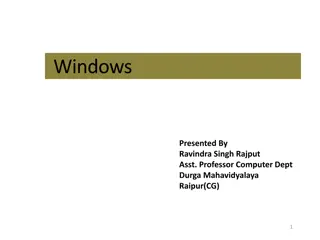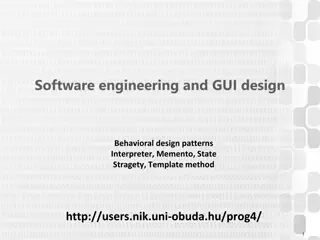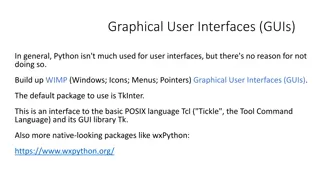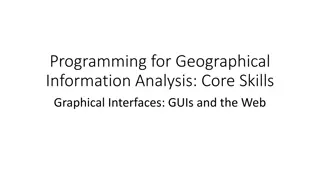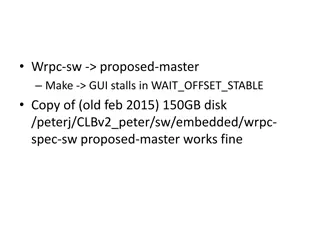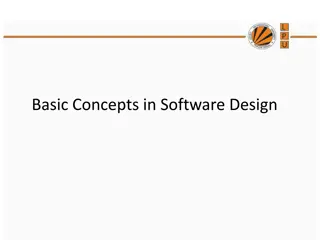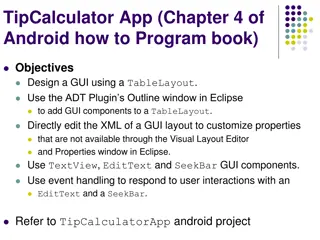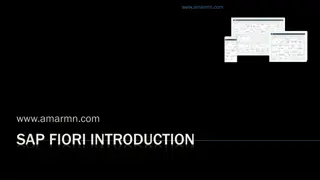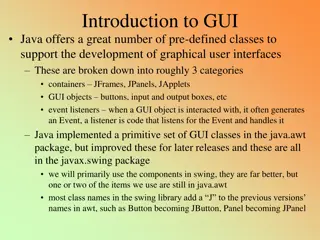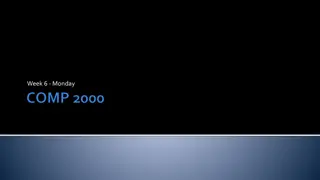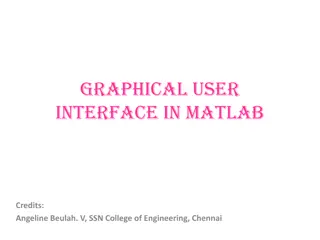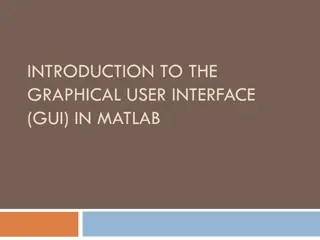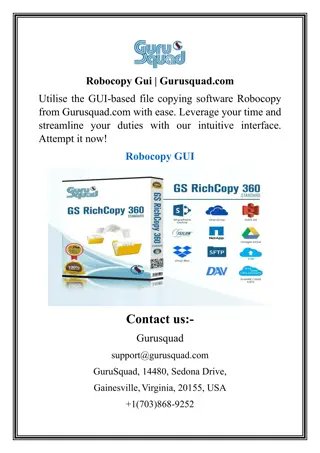Kunming Gui Gu Flower Planting Co., Ltd. - Preserved Flowers & Humidifier Product
Kunming Gui Gu Flower Planting Co., Ltd. is a leading enterprise specializing in preserved flowers, offering a variety of exquisite preserved flower products. Their latest product, a Humidifier with built-in colorful lights, is designed to adjust indoor humidity while adding a touch of beauty to any
0 views • 45 slides
The Evolution of Graphical User Interfaces in Computing
Graphical User Interfaces (GUIs) have transformed computing into a more user-friendly and interactive experience, emphasizing the shift from technology-focused to human-centric living. This chapter delves into the various aspects of GUIs, including I/O alternatives, common GUI tasks, programming per
1 views • 32 slides
Introduction to Unix-like Systems and Shell Interaction
Unix-like systems, such as Linux, Android, iOS, and macOS, are prevalent in various devices. The Unix shell acts as an intermediary between users and the operating system, allowing for program execution and process management. Secure Shell (SSH) and X Window System enable remote machine connections
4 views • 19 slides
Introduction to Visual Basic for Windows Application Development
Microsoft Visual Basic is a powerful tool for creating applications on the Windows platform. It offers a user-friendly environment with features such as event-driven programming, GUI creation, and integration with ActiveX technology. The IDE makes development tasks like design, editing, compiling an
3 views • 27 slides
Software Engineering Design Principles and Concepts
The chapter discusses the essential principles and concepts in software design, highlighting the four key design models - data design, architectural design, interface design, and component-level design. It emphasizes the importance of traceability to the analysis model, minimizing the gap between so
2 views • 36 slides
Challenges and Considerations in GUI Design
Designing a user interface is a complex process that can determine the success or failure of a software program. Dr. Riley and Dr. Yoder highlight the difficulties in creating effective GUIs, emphasizing the importance of layout principles, understanding user needs, and considering the diverse abili
5 views • 24 slides
Challenges and Solutions in Using EPICS for Digital DAQ Systems
Digital DAQ systems based on EPICS face issues with version control, data reading, trigger handling, and GUI consistency. Solutions involve code optimization, improving trigger management, and enhancing GUI design for better user experience.
2 views • 5 slides
Comparison of GUI-Based and Text-Based Assignments in CS1
This study investigates the effectiveness of GUI-based assignments compared to text-based assignments in a CS1 course. The research explores how student motivation impacts their performance and retention in the course. It also delves into student preferences between GUI-based and text-based assignme
0 views • 19 slides
AWT and Swing for GUI Programming in Java
Explore the differences between AWT and Swing for building graphical user interfaces in Java. Learn how Swing components offer more flexibility and platform independence compared to AWT, with features like pluggable look-and-feel support and internationalization. Dive into the key features of Swing
0 views • 59 slides
Introduction to Java GUI Programming
Java GUI programming involves transitioning from AWT to Swing, utilizing prebuilt components, and understanding the anatomy of a GUI application. Learn how to create, configure, and interact with GUI components such as buttons and labels, and build applications from the bottom up. Explore sample cod
0 views • 19 slides
Graphical User Interfaces (GUIs) and JOptionPane in Java
Introduction to Object-Oriented Programming (OOP) and GUI concepts in Java, focusing on GUI hierarchy, designing GUIs, working with containers and components, utilizing JOptionPane for graphical input/output, and examples of showMessageDialog and showConfirmDialog in Java applications.
0 views • 90 slides
Introduction to Java GUI with Swing Part I
Understanding Java GUI components with Swing and AWT, top-level containers, containment hierarchy concepts, menu bars, content panes, and component hierarchy. Exploring various container classes and their roles in GUI programming.
1 views • 64 slides
Overview of Java Socket Programming and GUI APIs
Java Socket Programming facilitates data sharing between computing devices through client-server communication using sockets. This tutorial covers topics on Socket Programming, establishing socket connections, and a demo showcasing client-server interactions. Additionally, it explores GUI APIs like
0 views • 25 slides
An Overview of GUI Controls in Java Programming
Explore the different GUI controls in Java programming, including buttons, text fields, checkboxes, radio buttons, combo boxes, and more. Learn about the three main steps in creating a GUI, the Swing GUI overview, and various categories of Swing components with code examples.
0 views • 62 slides
Overview of GUI Development Using NetBeans and Java
Explore the world of GUI development with NetBeans IDE and Java. Learn about building graphical user interfaces, utilizing event listeners, JDBC APIs, frameworks, and visual designers. Follow along with step-by-step instructions and visual examples to enhance your Java programming skills.
0 views • 22 slides
Introduction to Java Graphics and GUIs in Software Design & Implementation
Introduction to Java graphics, Swing/AWT libraries, event-driven programming, user interaction, essential terminology, and perspective in software design & implementation using Java. The material covers organization of AWT/Swing library, essential widgets/components, graphics, user events, and build
0 views • 30 slides
Introduction to GUI Programming in Python
Explore the key concepts and practical application of creating Graphical User Interfaces (GUIs) in Python using widgets, events, attributes, and layouts. Learn how to modify and create widgets, handle events, and utilize object-oriented programming for GUI development.
0 views • 26 slides
GUI Layout Managers in Java
Exploring the concepts of GUI layout managers in Java, including how to place GUI objects on a frame using different layout managers such as FlowLayout, GridLayout, and BorderLayout. This guide covers the functionality and characteristics of each layout manager to help you effectively design graphic
0 views • 26 slides
GUI Functionality for Register Log and Configuration Saving
This guide explains the steps to open a register log by double-clicking next to Idle in the lower left of a GUI and saving configurations by clicking on the floppy icon. The process involves CW settings, registers writes, and how the cfg file stores LMK and DAC settings.
0 views • 4 slides
GUI, Event-Driven Programming, and Graphics in Java/C#
Graphical User Interfaces (GUIs) play a crucial role in modern programming, allowing users to interact visually with applications. This module covers the basics of GUI design, frontend vs. backend coding, common GUI components, and layout positioning. GUIs, when well-designed, enhance user experienc
1 views • 28 slides
Design Inspiration and Elements in Costume and Fashion Design
Dive into the world of costume and fashion design through a visual journey of finding design inspiration, understanding the design process, emphasizing originality, and exploring different sources of creativity. Discover how technology, art, food, history, architecture, and nature can spark innovati
0 views • 45 slides
Human-Computer Interaction: CLI vs. GUI
Explore the evolution of Human-Computer Interaction (HCI) from its history to the advent of Command Line Interfaces (CLI) and Graphical User Interfaces (GUI). Learn about the advantages, disadvantages, applications, and how CLI and GUI differ in user interaction paradigms.
0 views • 19 slides
Multiple Sequence Alignment with PASTA Algorithm
Explore the PASTA algorithm for multiple sequence alignment, from installation to using the GUI for alignment and tree estimation. Learn about SAT and PASTA algorithms, the input process, and the steps involved in obtaining the best ML score alignment/tree pair. Dive into the PASTA GUI, initial alig
0 views • 19 slides
Material Design: Combining Classic Design Principles with Technological Innovation
Material Design is a design language that combines traditional design principles with the possibilities offered by technology and science. It emphasizes visual language, classic design elements, and innovation to create delightful user experiences. The Material Metaphor, Imagery, Typography, Color,
0 views • 34 slides
Automatically Repairing Broken Workflows for GUI Applications
Repairing broken workflows caused by GUI evolution in evolving applications is crucial for maintaining user experience and automated testing integrity. This research focuses on automatically suggesting replacement actions to adapt to changing interfaces without altering the underlying code, addressi
0 views • 40 slides
Comprehensive Guide to System Design Components and Techniques
System design involves the detailed planning and identification of components in an information system, aiming to provide users with a general understanding of the new system. This process includes techniques like flowcharts, prototyping, and component design, covering aspects such as output design,
0 views • 24 slides
GUI in Windows Operating System
Graphical User Interface (GUI) in Windows operating system is visually represented through icons, pointers, menus, and desktop elements. GUI standards ensure consistency across systems. Icons, cursors, and windows play key roles, allowing users to interact with applications efficiently. Learn how GU
0 views • 43 slides
Guide to Behavioral Design Patterns in Software Engineering and GUI Design
Learn about key behavioral design patterns such as Interpreter, Memento, State, Strategy, and Template Method in software engineering and GUI design. Understand their purposes, implementation techniques, and when to use them effectively. Explore how these patterns enhance the design and functionalit
0 views • 42 slides
Python GUI Development: Creating User-Friendly Interfaces
Python can be effectively used for creating Graphical User Interfaces (GUIs) by leveraging libraries like Tkinter and wxPython. This guide covers GUI design principles, event-based programming, and tips for enhancing the user experience. It emphasizes the importance of designing intuitive interfaces
0 views • 6 slides
Introduction to Graphical User Interfaces (GUIs) in Python for Geographical Information Analysis
This content provides insights into creating Graphical User Interfaces (GUIs) in Python for Geographical Information Analysis. It covers the basics of GUI development using TkInter and event-based programming with a focus on user experience design and functionality. The lecture emphasizes the import
0 views • 45 slides
Troubleshooting GUI Stalls and Git Updates in Wrpc-sw Repository
Resolve issues related to GUI stalls and Git updates in the Wrpc-sw repository. Includes guidance on checking out specific commits, submodule initialization, and updating. Also addresses update functions, state management, and configuration settings in the code.
0 views • 25 slides
Basic Concepts in Software Design
Software design involves transforming customer requirements into a form suitable for implementation, with activities categorized into preliminary and detailed design stages. High-level design focuses on module identification and control relationships, while detailed design entails defining data stru
1 views • 24 slides
Android GUI Design and Event Handling with TableLayout, SeekBar, and EditText
Learn how to design a GUI using TableLayout in Android, customize properties through XML, utilize TextView, EditText, and SeekBar components, and handle user interactions with EditText and SeekBar. Explore the application manifest file, creating Toast notifications, adapting to screen orientation ch
2 views • 20 slides
SAP Fiori: Revolutionizing User Experience with SAP
SAP Fiori is a collection of apps designed by SAP to provide a better user experience compared to its classical GUI. These apps are responsive, following SAP design principles and evolving with features like role-based adaptive design. The evolution of SAP Fiori has seen advancements like Fiori 2.0
0 views • 16 slides
Overview of GUI Components and Creating GUI in Java
In Java, GUI development is facilitated by a variety of pre-defined classes categorized into containers like JFrames and JPanels, GUI objects such as buttons and input boxes, along with event listeners for user interactions. The javax.swing package offers enhanced GUI classes compared to java.awt. K
0 views • 17 slides
Layout Managers in Java Swing GUI Development
In Java Swing GUI development, layout managers play a crucial role in arranging components within a container. This content delves into BorderLayout, GridLayout, and FlowLayout managers, explaining their characteristics and usage. Additionally, it mentions the importance of BoxLayout for advanced GU
0 views • 26 slides
Immediate Mode GUI: Theory, Implementation, and Example
Graphical User Interface (GUI) is a key element in software development, facilitating user interaction and displaying information. This content delves into GUI theory, discussing its architecture, implementation methods, object-oriented approach, and the concept of immediate mode GUI. It also showca
1 views • 21 slides
Introduction to Creating Graphical User Interfaces in MATLAB
Explore the world of creating Graphical User Interfaces (GUIs) in MATLAB with this informative guide. Learn how to design GUIs, program them to respond to user actions, and launch them effortlessly. Dive into essential topics such as GUI creation, component layout, and programming details, all witho
0 views • 40 slides
Introduction to Graphical User Interface (GUI) in MATLAB
A graphical user interface (GUI) allows users to interact with software using visual elements like menus, buttons, and icons, instead of text-based commands. In MATLAB, GUIs consist of two main files - an .m file for code and a .fig file for graphical elements. GUIs enable users to interact with MAT
0 views • 50 slides
Robocopy Gui Gurusquad
Utilise the GUI-based file copying software Robocopy from Gurusquad.com with ease. Leverage your time and streamline your duties with our intuitive interface. Attempt it now!\n\n\/\/gurusquad.com\/products\/gs-richcopy-360
1 views • 1 slides

